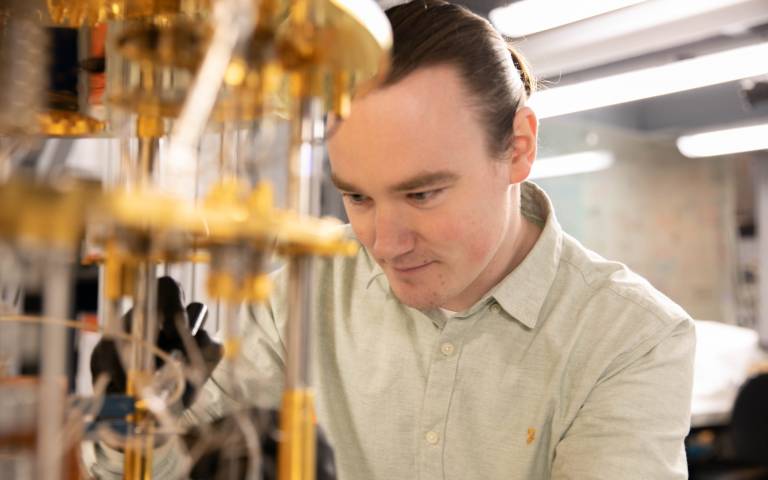Dr Michael Fogarty receives the Malcolm Chaikin Prize
23 January 2020
The prestigious award has been given for research excellence in engineering.

UNSW Sydney has awarded Dr Michael Fogarty the Malcolm Chaikin Prize for research excellence in engineering. Awarded annually, the prize is given to the doctoral student in the Faculty of Engineering who is judged to have produced the best PhD thesis, in the broadest sense, each calendar year.
Accepting this award Fogarty gave a public lecture at UNSW Sydney, on the 10th of December 2019 at the UNSW Engineering Post Graduate research symposium "for the purpose of stimulating and enthusing commencing research students".
Spin-Based Quantum Computing with Silicon MOS Quantum Dots
Fogarty’s doctoral thesis, completed in the group of Professor Andrew Dzurak, at the School of Electrical Engineering and Telecommunications, at UNSW, describes the process by which two fundamental quantum techniques for quantum computing - initialisation and readout of qubit pairs by scalable methods - have been combined with single qubit addressability and two-qubit interactions in an integrated silicon chip for the first time, confirming the promise of using silicon for quantum computing.
The research undertaken by Fogarty in his PhD focused on silicon metal-oxide-semiconductor (SiMOS) quantum dot qubits, developed in Professor Dzurak’s team. In his thesis, he demonstrates and details an integrated silicon qubit platform that combines both single-spin addressability – the ability to ‘write’ information on a single spin qubit without disturbing its neighbours – and a qubit ‘read-out’ process that will be vital for quantum error correction.
Integration of both these techniques via methods considered robust against scaling is the first fundamental step towards realising fully error corrected SiMOS quantum dot qubits useful for quantum computation.
His thesis also contributes to the understanding of experiments which benchmark the performance and degree of control over a single qubit and includes work towards demonstrating scaled quantum systems where a single logical qubit, robust against errors through built-in error correction schemes, is encoded on multiple qubits in a linear chain of silicon quantum dots.
At UCLQ
Michael currently holds a research associate position at the London Centre for Nanotechnology in the group of Professor John J. L. Morton, and is a senior engineer in the start-up Quantum Motion Technologies Ltd. Here at UCLQ, he works towards developing scaled quantum devices in the silicon materials platform focusing on device compatibility with industry standard foundry fabrication methods.
To find out more about Michael’s research visit Quantum Spin Dynamic’s group website.
PAPERS:
Nonexponential fidelity decay in randomized benchmarking with low-frequency noise: https://journals.aps.org/pra/abstract/10.1103/PhysRevA.92.022326
Integrated silicon qubit platform with single-spin addressability, exchange control and single-shot singlet-triplet readout: https://www.nature.com/articles/s41467-018-06039-x
Logical Qubit in a Linear Array of Semiconductor Quantum Dots: https://journals.aps.org/prx/abstract/10.1103/PhysRevX.8.021058
IMAGE CAPTION: Dr Michael Fogarty (Credit: H. Bennie, UCL)
 Close
Close

